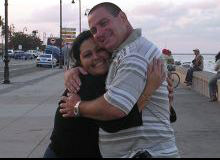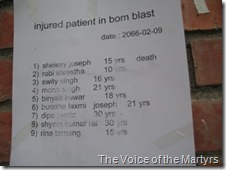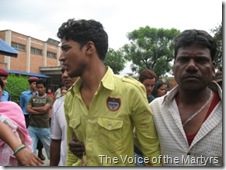Given my present battle with cancer and my work with persecuted Christians who suffer both injury and sickness because of their faith, it is common for people to seek to remind to me that "healing in the atonement," and that I and persecuted Christians need to claim healing in our lives, basing their belief mostly on Isaiah 53:3-4 which reads,
He was despised and rejected by men;
a man of sorrows, and acquainted with grief;
and as one from whom men hide their faces
he was despised, and we esteemed him not.
Surely he has borne our griefs
and carried our sorrows;
yet we esteemed him stricken,
smitten by God, and afflicted. (ESV)
But is this what these verses teach?
There are two New Testament passages that are often seen to be directly quoting Isaiah 53:4. The most obvious quote is Matthew 8:17. Many assume that 1 Peter 2:24 also quotes Isaiah 53:4, but as Erickson points out, this assumption is not as clear as some would believe.[1] Peter gives none of the typical indications that he is quoting an Old Testament passage. We do not find the words "as it is written" or any other similar formula or phrase. Rather, it seems likelier that he is referring to the whole of Isaiah 53, and particularly to verse 12.[2] How, then, are we to understand how Jesus’ ministry in Matthew 8:17 fulfilled the prophecy of Isaiah 53:4? An in-depth investigation becomes essential at this point.
Isaiah 53:4 reads, "Surely our griefs He Himself bore, and our sorrows He carried."[3] The primary meaning of the first noun, chale is that of "physical sickness" or "disease,"[4] though the term can also mean spiritual sickness, as in Isaiah 1:5 and Hosea 5:13.[5] As the New American Standard translation reflects, the word is placed in the emphatic position in the sentence. The verb nasa' has basically three separate meanings: "to lift up"; "to bear, carry, support"; "to take, take away"[6], though the predominant meaning is "to lift (up)".[7] Many interpreters take nasa' in this context as meaning to "to bear" or "to carry" vicariously[8] and, indeed, this term can refer to vicarious bearing.[9] Erickson argues, however, that in the one hundred verses listed by Brown, Driver and Biggs in which the meaning is "to bear, carry," "only six have reference to a vicarious bearing of guilt".[10] Erickson contends that the more likely rendering in Isaiah 53:4 is "has taken".[11] The verb, itself, does not mean, "to bear the punishment of," as Stott points out. "We are obliged to translate it thus only when sin is its object.[12] Erickson adds: "It should also be noted that Isaiah did not put the verb in an emphatic position; it seems that what is really important is what the suffering servant has taken, not how he has taken it."[13]
The second noun in this passage mak'ov only appears sixteen times in the entire Old Testament, in which at least eleven occurrences refer to mental suffering.[14] Gesenius calls it "pain of soul."[15] Erickson says, "The basic idea conveyed by the word is mental pain, sorrow, or distress resulting from the toilsomeness of life, including its physical burdens."[16] The likeliest meaning here, then, would seem to be that which the New American Standard and New International Version have adopted, "sorrows" or perhaps distress, perhaps as a result of physical infirmities."[17] The second verb sabal means basically "to carry a heavy load."[18] The word appears nine times in the Old Testament. Lamentations 5:7 and Isaiah 53:11 (in particular) convey the idea of vicarious bearing. In the remaining instances, sabal merely means "'carrying a load'; there is no connotation of vicariousness."[19] While the verb in Isaiah 53:4 may hold the concept of vicarious bearing, as some believe,[20] there is no reason to demand that it must. As Erickson points out, "Here again, just as in the first clause, the emphasis is on what the suffering servant has carried rather than on how he has carried it."[21]
It must be admitted that there are various ways in which this verse may be taken. It does seem that Isaiah in verse 4 is speaking of actual physical and mental afflictions, though not necessarily to a vicarious bearing of them, and as Erickson states, "in Matthew's quotation of this passage, we find something very similar."[22] Matthew's rendering of Isaiah 53:4 is quite unusual because it follows neither the LXX or Targum, both of which spiritualize the Hebrew.[23] Carson holds that Matthew 8:17 is most likely Matthew's own translation of Isaiah 53:4, given the significant alterations from either the LXX or the Targum.[24] One significant difference between the LXX (which Matthew often quotes in his gospel) and his quotation of Isaiah is in his substitution of verbs in the first phrase of Isaiah's passage. In the LXX, the phrase used the verb phero, which could conceivably be translated as "bearing vicariously." Matthew, however, substitutes lambano for phero, a word nowhere used in connection with vicarious bearing of guilt or anything similar.[25] Lambano is merely an extraordinarily common word with little or no theological significance. In Matthew 8:17, it simply means "to take away" or "remove."[26]
The second verb bastazo is very close in meaning to sabal, meaning "to bear" or "to carry" but "in none of its usages does it signify ‘to bear vicariously.'"[27] Perhaps what it meant here is a sympathetic bearing such as we find in Galatians 6:2.[28] Robertson writes, "The passage as Mt. employs it, has no bearing on the doctrine of the atonement."[29] But, he adds, "Jesus does show his sympathy with us. Christ's sympathy with the sufferers was so intense that he really felt their weaknesses and pains. In our burdens Jesus steps under the load with us and helps us carry on."[30] Erickson concurs: "What we are suggesting here, then is that both Matthew and Isaiah are referring to actual physical sicknesses and mental distresses rather than sins."[31] Erickson continues, "It seems likelier that they are referring to a sympathetic bearing of the troubles of this life. If this is the proper interpretation, Jesus ‘took our infirmities and bore our diseases' by becoming incarnate rather than by offering atonement."[32]
R.T. France notes that for Matthew, it is important that Jesus be seen to fulfill the role of the Isaianic Servant of the Lord.[33] Yet, as France points out, "it is remarkable that neither of these passages (Matt. 8:17 or Isa. 53:4) refers to the distinctive role of redemptive suffering, either in the specific words cited or in the aspect of Jesus' ministry to which they are applied."[34] "It is in the totality of his life and ministry, not only in its redemptive aspect, that Matthew delights to trace Jesus' fulfillment of the scriptural pattern."[35]
We conclude by noting that this explanation of how Isaiah's prophecy was fulfilled answers the chronological difficulties of how the effects of the atonement could actually be said to be in effect before the atonement was even accomplished. If the atonement were in view in Matthew 8:17, it is hard to explain why Matthew quotes this verse in a context some time before Christ’s actual death. If, however, it is the incarnation that is in view here (and in Isaiah 53:4), and not the atonement, then there is no chronological difficulty at all. This view also best fits the context and syntax of each passage. We conclude, therefore, that the emphasis of Matthew 8:17 and Isaiah 53:4 is the incarnation rather than the atonement.
In summary, while Isaiah 53 (as a chapter) primarily emphasizes the sacrificial work of the Suffering Servant on behalf of mankind's sin, Matthew quotes these verses in 8:17 in reference to His ministry before He goes to the cross. In Matthew’s mind, he sees the prophecy of Isaiah 53:3-4 fulfilled in Jesus’ incarnation rather than the atonement, as He heals the sick (8:1-16).
Matthew 8:17 records that as a result of the healing ministry of Jesus (vv. 1-16), the prophecy of Isaiah 53:4 was fulfilled, "He Himself took our infirmities and carried away our diseases."
In other words, by coming and living among us, Jesus took on all aspects of what it meant to live in a fallen world. As He saw the suffering of people, his sympathy was so intense that he actually felt their pain and weaknesses. He saw the burdens that many carried, and He stepped under the load with us and helped carry it.
In becoming a man, Jesus "took our infirmities and bore our diseases." By coming to earth, he entered into the very conditions that we find here, including sorrow, sickness, and suffering. Experiencing sickness and sorrow himself, and sympathizing as he did with human suffering, he was moved to alleviate the miseries of this life when He witnessed them.[36] Time and time again we see throughout the gospels that Jesus healed because He pitied.[37] By means of His deep sympathy or compassion, Jesus entered "fully and personally into the sorrows of those whom He came to rescue."[38] As Bredin puts it, "He enters into the fears and pain, the tears and the worries and the anxieties of people in order to transform them."[39]
Hence, do I believe in healing? Yes, but it comes through the mercy and grace of my Lord alone.
____________________________________
[1] Millard Erickson, Christian Theology. Baker Book House, 1985: 841
[2] Ibid.; D. Edmond Hiebert, First Peter. Moody Press, 1984: 176-180; E.G. Selwyn, The First Epistle of St. Peter. Macmillan & Co. Ltd., 1961: 180
[3] New American Standard Bible, The Lockman Foundation, 1960, 1962, 1963, 1968, 1971, 1972, 1973, 1975, 1977, 1995
[4] As reflected in translations such as the New Revised Standard Version and New International Version
[5] Francis Brown, S.R. Driver, and Charles A. Biggs. Hebrew and English Lexicon of the Old Testament. Oxford University, 1955: 318; William Gesenius, Hebrew-Chaldee Lexicon to the Old Testament. trans. Samuel Prideaux Tregelles. Baker Book House, 1857 rpt. 1979: 279-280; Carl Philip Weber, hālâ in Theological Wordbook of the Old Testament , Vol.1. ed. R. Laird Harris, Gleason L. Archer, and Bruce K. Waltke. Moody Press, 1980: 286-287
[6] Walter C. Kaiser, nasa' in Theological Wordbook of the Old Testament, Vol.2. ed. R. Laird Harris, Gleason L. Archer, and Bruce K. Waltke. Moody Press, 1980: 600
[7] Erickson: 839; Gesenius: 567
[8] Kaiser, nasa': 601; Franz Delitzsch, Isaiah.William B. Eerdmans, rpt. 1983: 316-317; Derek Kidner, "Isaiah" in The New Bible Commentary: Revised . ed. D. Guthrie and J.A. Motyer. William B. Eerdmans Publishing Co., 1970: 618
[9] e.g. Isaiah 53:12
[10] Erickson: 839
[11] As reflected in the New International Version
[12] Stott: 244
[13] Erickson: 839. Emphasis added
[14] John N. Oswalt, mak'ov in Theological Wordbook of the Old Testament, Vol.1. ed. R. Laird Harris, Gleason L. Archer, and Bruce K. Waltke. Moody Press, 1980: 425
[15] Gesenius: 471
[16] Erickson. p.839
[17] Ibid.
[18] Brown, Driver and Briggs: 687; R.D. Patterson, sabal in Theological Wordbook of the Old Testament, Vol.2. ed. R. Laird Harris, Gleason L. Archer, and Bruce K. Waltke. Moody Press, 1980: 616
[19] Erickson: 838-840
[20] Gesenius: 578; Patterson: 616
[21] Erickson: 840
[22] Ibid.
[23] D.A. Carson, Matthew. Expositor's Bible Commentary. Zondervan Publishing House, 1984: 205.
[24] Ibid.
[25] Erickson: 840. cf. Walter Bauer, W. F. Arndt, F. W. Gingrich, and F. W. Danker, A Greek-English Lexicon of the NT and Other Early Christian Literature. 2d ed. rev., University of Chicago, 1979: 464-465; Harold K. Moulton, The Analytical Greek Lexicon Revised . Zondervan Publishing House, 1978: 246
[26] Bauer, Arndt, Gingrich and Danker: 464; Louw and Nida: 270
[27] Erickson: 840
[28] Ibid.; A.T. Robertson, Word Pictures in the New Testament. Vol.1. Matthew and Mark. Harper & Brothers Publishers, 1930: 67; A.B. Bruce, Matthew. The Expositor's Greek Testament. William B. Eerdmans Publishing Co., 1900, rpt. 1980: 141; John MacArthur, Jr., Charismatic Chaos. Zondervan Publishing House, 1992: 104
[29] Robertson: 67
[30] Ibid.
[31] Erickson: 840
[32] Ibid.
[33] e.g. Matt. 3:15 - Isa. 53; Matt. 8:17 - Isa. 53:4; Matt. 12:15-21 - Isa. 42:1-4; Matt. 27:57 - Isa. 53:11
[34] R.T. France, "Servant of Yahweh" in Dictionary of Jesus and the Gospels. ed. Joel B. Green, Scot McKnight, I. Howard Marshall. InterVarsity Press, 1992: 746
[35] R.T. France, Matthew. William. B. Eerdmans Publishing Co., 1985: 159. cf. France, "Servant of Yahweh": 746
[36] cf. Erickson: 840
[37] e.g. Matt. 9:36; 14:14; 20:34; Mark 1:41; 5:19; 6:14; Luke 7:13
[38] MacArthur: 104.
[39] Eamonn Bredin, Rediscovering Jesus. Twenty-third Publications, 1985: 99
 Like young women everywhere, Mei Lin longs for an education, a career-even love. But the system she lives in does not tolerate religious beliefs and Mei Lin’s faith is as profound as it is simple. Must she abandon her beliefs to have the life she’s dreamed of? In this debut novel, the author employs the unusual setting of today’s China to draw readers into the landscape of the heart. ($15.00. Paperback, 278 pages)
Like young women everywhere, Mei Lin longs for an education, a career-even love. But the system she lives in does not tolerate religious beliefs and Mei Lin’s faith is as profound as it is simple. Must she abandon her beliefs to have the life she’s dreamed of? In this debut novel, the author employs the unusual setting of today’s China to draw readers into the landscape of the heart. ($15.00. Paperback, 278 pages)

 Dead Aid by Dambisa Moyo. As you can tell from my blogs from the last couple of days, I like this book. I like it a lot. Addresses the fact that fifty years of giving aid to African countries has NOT improved the lives of Africans but made things worse. But the author does more than just point out the problem. The second half of the book is dedicated to providing workable solutions. This is a book that cannot be ignored by anyone serious about really improving the lives of those in need.
Dead Aid by Dambisa Moyo. As you can tell from my blogs from the last couple of days, I like this book. I like it a lot. Addresses the fact that fifty years of giving aid to African countries has NOT improved the lives of Africans but made things worse. But the author does more than just point out the problem. The second half of the book is dedicated to providing workable solutions. This is a book that cannot be ignored by anyone serious about really improving the lives of those in need.  I could not agree more. I am convinced, even at a smaller level, that simply providing aid to those in need does not solve their long term (macro) problem. Dependency on outside aid stifles not only the economic growth of countries but (on a smaller level), I believe, the economic growth of families and churches. The time has long since passed when organizations like our own need to look beyond the short-term needs to long-term solutions and recognize that simply addressing short-term problems (micro) leads to inevitable long-term dilemmas like the one referred to above. It is time to reconsider, for example, the wisdom of shipping blankets and clothing from the West to nations where local Christians, in particular, could be benefitted by doing business with them. If Bibles and books can be printed in-country, then they should be. If local churches can be enabled through microcredit projects to support their own pastors and evangelists, then they should be rather than paying them out of Western coffers. Yes, I know that donors in the West like to get involved in practical ways like donating clothing, sponsoring national pastors, and other such things. But isn’t it time that we thought beyond donor relations when it comes to program planning? Isn’t it time we started educating the Western church to understand that money is not the solution to every problem in the developing world and that local problems should be solved using local resources as much as possible?
I could not agree more. I am convinced, even at a smaller level, that simply providing aid to those in need does not solve their long term (macro) problem. Dependency on outside aid stifles not only the economic growth of countries but (on a smaller level), I believe, the economic growth of families and churches. The time has long since passed when organizations like our own need to look beyond the short-term needs to long-term solutions and recognize that simply addressing short-term problems (micro) leads to inevitable long-term dilemmas like the one referred to above. It is time to reconsider, for example, the wisdom of shipping blankets and clothing from the West to nations where local Christians, in particular, could be benefitted by doing business with them. If Bibles and books can be printed in-country, then they should be. If local churches can be enabled through microcredit projects to support their own pastors and evangelists, then they should be rather than paying them out of Western coffers. Yes, I know that donors in the West like to get involved in practical ways like donating clothing, sponsoring national pastors, and other such things. But isn’t it time that we thought beyond donor relations when it comes to program planning? Isn’t it time we started educating the Western church to understand that money is not the solution to every problem in the developing world and that local problems should be solved using local resources as much as possible?  La Familia Gude Pérez
La Familia Gude Pérez 















 The Voice of the Martyrs joins with
The Voice of the Martyrs joins with 











